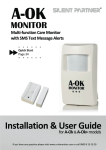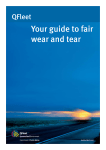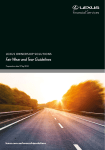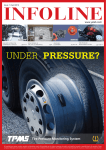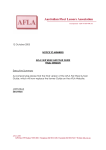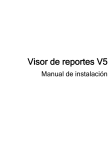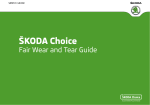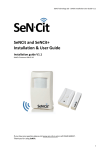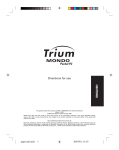Download Education Transport User Guide
Transcript
Education Transport User’s Guide Revised December 2010 EDUCATION TRANSPORT USER’S GUIDE Contents Introduction 1 Pupils travelling by bus or coach 2 Pupils travelling by taxi 3 Parents of children travelling by bus or coach 4 Parents of children travelling by taxi or minibus 5 Schools 6 Escorts 7 Drivers 8 Contractors 9 Integrated Transport Unit (ITU) Introduction The Integrated Transport Unit is responsible for the planning and organisation of education transport for all eligible pupils and students in accordance with the policies of Bracknell Forest Council. The arrangements are made in such a way as to maximise the efficiency and cost- effectiveness of service provision. The Unit also has responsibility for the safety and equality of education transport services. This code of good practice provides guidelines for pupils, parents, schools, escorts, drivers and the Integrated Transport Unit to ensure that education transport provided by the Council is as safe and effective as possible. It is the objective of the Integrated Transport Unit: To secure the effective and efficient provision of socially and educationally necessary passenger transport services that are: Safe, reliable, accessible and appropriate. In accordance with statutory obligations and policies of this Council. Using the most advanced transport planning and data handling techniques available to co-ordinate the provision so as to achieve the best overall value for money on behalf of Bracknell Forest Council. If you have any questions regarding school transport services, or if you need advice about obtaining further copies of this booklet, please contact the Integrated Transport Unit Central Depot Old Bracknell Lane West Bracknell Berkshire RG12 7QT 01344 352002 [email protected] 1 Pupils Travelling by Bus or Coach 1 Must always arrive at the boarding point in good time and make sure that they have their travel passes with them. They must show the travel pass to the driver each time that they board the vehicle. Failure to produce a travel pass may result in transport being refused, and parents or guardians will have to make other transport arrangements at their own expense until a travel pass can be produced. 2 Must not play about near the road while waiting for the bus or other transport. They should wait on the pavement, in a safe position well back from the road. They should not run towards, or round the vehicle. 3 Must respect the property of others whilst waiting at the bus stop. 4 Must not try to get on or off the transport until it has stopped. 5 Must not push or rush for the door when the vehicle has stopped. 6 Must find a seat quickly and quietly without pushing. Where the vehicle has a seat belt, make sure that it is used and fastened correctly. 7 Must listen to the driver and do as he or she says. 8 Must always, when they are on the transport, stay in their seats at all times when the vehicle is moving. 9 Must not engage in horseplay on the transport, as this is dangerous and could cause an accident. Report any incident or accident to the driver at an appropriate time. 10 Must not distract the driver while he or she is driving. 11 Must not eat or drink on the transport. 12 Must not smoke on the transport. 13 Must not cause damage, including graffiti; must not spit, or interfere with emergency doors or window mechanisms or leave litter on the vehicle. 14 Must take care that their coats, scarves or bags are not caught in the door as they enter or leave the vehicle. 15 Must make sure that they have all their belongings as they leave the vehicle. If they have forgotten something, telephone the company that operates the service. 16 Must not try to get back on the vehicle after they get off, in case it moves suddenly. 17 Must see that younger pupils are well clear of the vehicle when you are getting off the transport. Remember - older pupils should set a good example. 18 Must not cross the road close behind or in front of a bus or any other vehicle. They must be able to see clearly both ways. Where possible, use a pedestrian crossing. 19 Must follow the Green Cross Code at all times when walking to or from the boarding or alighting points. 20 When you are using public services, have consideration for other passengers. 2 Pupils Travelling by Taxi 1 Must be ready at the agreed time and should be escorted to the taxi by the parents or carers who should assist the child getting into the vehicle. 2 Must not go near the vehicle until it has stopped. Do not run towards it, or around it. 3 Must listen to the driver and escort where applicable and do as he or she says. 4 Pupils who are under 12 years old or less than 135cms or 4’5” tall must use an appropriate car or booster seat provided by the parents/carers. 5 Must always, when they are in the taxi, stay in their seats at all times when the vehicle is moving. 6 Must not engage in horseplay on the transport, as this is dangerous and could cause an accident. 7 Must not eat or drink on the transport. 8 Must not cause damage, including graffiti: must not spit, or interfere with doors or window mechanisms or leave litter in the vehicle. 9 Must take care that their coats, scarves or bags are not caught in the door as they enter or leave the vehicle. 10 Must make sure that the have all their belongings as they leave the vehicle. If they have forgotten something, telephone the taxi company that operates the service. . 3 Parents of Children using Public or Contracted Buses/Coaches 1 Where necessary, ensure that children are accompanied to the bus stop or agreed pick-up point in good time, and that they are supervised until the bus arrives. 2 It is your responsibility to ensure that your child(ren) has a travel pass with him or her each time they board the vehicle if appropriate. Drivers are required to check travel passes, and failure to produce one may result in your child being refused transport. You will then have to make alternative arrangements, at your expense, to get your child to school until a travel pass can be produced. 3 Where necessary, ensure that children are met when the transport returns from school. Remember that children often forget road safety as they get off the vehicle. 4 Make sure your child knows what to do if the bus or other transport is late, or does not arrive. 5 Remind young people that playing about at bus stops and on busses can cause accidents and injuries. Make sure your children do not wear clothing that can be dangerous e.g. hanging belts or bags with loose straps, and rucksacks are carried and not worn on the transport. 6 Notify the staff of the Integrated Transport Unit of any changes to your circumstances immediately. If your ticket is no longer required, please return it to the team so it can be cancelled. 7 Season tickets are available. Replacements will be charged for. Lost, stolen, or damaged tickets should be reported immediately to the Integrated Transport Unit who will advise you how to obtain a replacement. 8 If you have any concerns about the provision of transport, you should contact the Integrated Transport Unit. 9 Teach children the safety rules. Make sure they understand the rules for pupils in this booklet. If your child is unaccompanied between home and the bus stop, make sure that he or she knows and follows the safest route and uses the safest crossing places. 10 If your child misbehaves whilst travelling transport may be withdrawn and the responsibility to ensure your child attends school will be yours. Remember – you will be held responsible for any vandalism caused by your child. 4 Parents of Children using taxis or minibuses 1 Where the transport is provided to or from you home address please ensure your child is ready in good time to meet the vehicle and assist your child into, or out of the vehicle. It is your responsibility to escort your child to and from the vehicle at the start and end of the day. 2 Where applicable, it is your responsibility to ensure that an appropriate car or booster seat is provided for any child travelling by taxi or minibus who is under 12 years old and under 135cms or 4’ 5” tall. 3 Advise the driver or escort if there may be a particular difficulty with your child on a specific day. 4 Advise the ITU if there are any changes to your child’s needs or arrangements that are in place – i.e. your child now requires wheelchair transport or your child is changing their attendance times. 5 Advise the ITU is you move or change telephone numbers – we may need to contact you in an emergency. 6 Advise the transport operator if your child is unwell and does not require transport on a particular day – this will prevent a wasted journey. You should also advise the ITU on 01344 352002 – the office is manned between 08:30 and 16:30 or leave a message on our ansaphone outside of these hours. You must also advise us when your child will be returning to school so that we can let the taxi operator know. 7 If you are not at home when the taxi arrives after school please be aware that we will make every effort to contact you or the emergency contact provided in your child’s transport review form. If we are unable to make contact your child will be taken to Social Services in Time Square and you will need to make arrangements to collect him/her yourself. 8 If you have any concerns about the provision of transport, you should contact the Integrated Transport Unit on 01344 352002 or by email [email protected]. 5 Schools 1 Make sure that children understand the rules for safety on buses and other transport. 2 Ensure children understand the consequences of misbehaviour on transport and at bus stops. 3 Work with parents, drivers, escorts, and council staff in cases of problem behaviour. 4 Consider appointing transport prefects or assisting the operator to draw up seating plan if needed. 5 Provide adequate supervision at set down and pick-up points, and advise operators of any special parking arrangements at your school. 6 Wherever possible, make sure that private cars do not obstruct bus stops outside schools. 7 Agree contingency plans with operators and the ITU in case of bad weather or other emergencies, ensure that the operators and ITU are aware of inset, or early finish days. 8 Should any school transport fail to arrive, contact the operator or the ITU. Keep children together whenever possible. 9 Ensure that pupils understand that season tickets or travel passes, where issued, must be produced when requested by the operators, drivers, or council representatives. 10 Notify the ITU of any changes to pupil circumstances, e.g. change of address, pupil moving away from the area, or leaving school. 6 Escorts 1 Ensure that children are safely transported to school by following the guidelines below Keep doors closed until the vehicle is at a complete standstill; Do not allow children to open or close vehicle doors Do not allow children to leave the vehicle until you have arrived at your destination Assist parents to help pupils board and alight the vehicle by being as helpful as possible, but remain aware that your own safety and wellbeing is important; Discourage children from crossing in front of, or immediately behind the vehicle; Do not allow any child to assist in the loading of other pupils onto the vehicle; Ensure all children are seated and wearing seat belts or restraints where appropriate; Check, with the driver, that any seat belts, restraints, or wheelchair clamps are correctly fastened, and that you understand how they operate and are secured; Make sure that all luggage or wheelchairs etc. are safely stored; On arrival at your destination get out of the vehicle and ensure that all children are well clear of the vehicle, and that nobody has returned to collect property they have left behind; Close doors on the vehicle before advising the driver that it is safe to move off ensuring nothing is caught in the doors; 2 From your seat in the vehicle you should be able to reach the doors easily and also be able to watch the children and control behaviour. 3 In the event of severe, or persistent, misbehaviour notify the head teacher or your employer immediately. Never evict a child from the vehicle. If you threaten to report misbehaviour, then do so. 4 Maintain a courteous, professionally detached relationship with the pupils and your driver. Inappropriate conversation topics and language must be avoided at all times. 5 Co-operate with the ITU, teachers and parents to resolve any problems related to the transport of pupils in your charge. 6 Ensure that the vehicle completes its allocated route, and all children are picked up according to the schedule provided. 7 Remain with the children in the event of breakdown or accident. Never leave them unattended. If necessary, enlist help of a passer-by to summon assistance. 8 Make sure you are familiar with any special needs of the children you escort and you have easy access to any Care Plans supplied by the ITU 9 Do not eat or drink on the vehicle. 10 Do not smoke on the vehicle or on any school premises. 11 Ensure that all information you have regarding the children you transport is kept and remains confidential 12 Do not make contact with the children you transport on any social networking sites 13 Do not take any changes in the arrangement your company has provided from parents. Parents must be advised to contact the Integrated Transport Unit for any changes to travel arrangements although in a small number of cases this may be after the event where there are last minute issues i.e. sickness 7 Drivers - General 1 The welfare of the pupils and other road users is of paramount importance. 2 Do not drive a vehicle you consider to be unroadworthy or in contravention of PCV regulations, other legislation or licensing regulations. Report any faults to your employer immediately. 3 The use of a mobile telephone is strictly prohibited while the vehicle is in motion. 4 Do not eat of drink while driving 5 Drivers are advised, for their own safety when transporting female passengers on their own, to ask the passenger to sit in the back of the vehicle 6 Drivers should not make contact with any of the children they transport on social networking sites 7 Work with escorts and be aware of any problems or special needs a pupil may have. 8 Follow the scheduled route and use only designated pick-up and set down points. If it proves impossible to maintain the schedule timetable notify you employer about the problem. 9 Check pupils’ passes each time that they board the vehicle where appropriate to ensure they are entitled to travel. Do not refuse to carry a pupil who does not produce a passreport the incident to your employer after reaching your destination and follow subsequent instructions. Never allow any other unauthorised passengers to travel on your vehicle. 10 Avoid physical contact with pupils wherever possible. Maintain a courteous and professionally objective relationship with your passengers and any escorts. Inappropriate conversation topics and bad language must be avoided at all times. Radio/music volume should, if used, be at a reasonable level – remember some of the children you may be transporting my not react well to loud noise. 11 Report any incident of misbehaviour to the head teacher at the school and to your employer. If you threatened to report misbehaviour, then do so. Do not evict a child from the vehicle. 12 Check for lost property at the end of journeys, and hand any items found to your employer. 13 Parents must be advised to contact the ITU for any changes to travel arrangements although in a small number of cases this may be after the event where there are last minute issues i.e. sickness Boarding and Alighting 1 Approach each stop slowly and with care. Do not break sharply. Wherever possible pick up and set down onto the pavement, and not onto the carriageway. 2 Hazard warning lights may be used when pupils are boarding and alighting, as circumstances and legislation dictate. 3 Keep the doors closed until you have bought the vehicle to a complete standstill. Do not allow children to open or close the doors of your vehicle. 4 Check all tickets where appropriate. Always wait for several seconds before closing the door. Check that doors are properly closed, and that nothing is trapped in them, inside or out. Use nearside mirrors to check for late comers trying to board before pulling away. 5 Do not drive away until all pupils are seated and/or secured. 6 When unloading make sure that all pupils are well clear of the vehicle before moving off. 7 Discourage children from crossing in front of or immediately behind the vehicle. Tell them to wait until the vehicle has moved off. 8 When delivering a child to his or her home address, wait until a responsible adult receives the child and that person is adequately supervising the pupil. 9 Ensure you are familiar with any equipment on the vehicle to assist with boarding and alighting, such as wheelchair lifts or ramps, and that you know how to fit and secure wheelchairs and seats correctly. 10 If pupils have to exit at the rear of a minibus, make sure they are supervised. 11 If you have to reverse the vehicle activate the buzzer, if fitted. Only reverse before setting down, or after picking up pupils. 12 Co-operate with school and authority staff over arrangements for parking, and the picking up and setting down of pupils within the school grounds. Safety in the vehicle 1 Where seat belts are fitted, ensure they are used. If a child has a special harness or wheelchair make sure you know how to deal with them, that they are secured before moving off and that there is an independent passenger restraint for each wheelchair user. 2 Make sure all luggage is safely stowed, and the gangway and emergency exits are not obstructed. 3 Do not allow your vehicle to be loaded beyond its capacity. 4 Follow the highway codes at all times. Adhere to speed limits. 5 Do not smoke on school transport vehicles or on school premises. 6 “School Transport” signs should always be used. Ensure they are in the appropriate positions, and only displayed when the vehicle is being used to transport pupils. 7 Ensure that child locks are used, when fitted, to rear doors In an Emergency 1 In the event of breakdown or accident enlist the help of a passer-by to summon assistance. If no help is available - make sure that the vehicle is in a safe immobile condition before leaving it. Instruct the pupils that they must not leave the vehicle. If necessary, appoint an older pupil to take responsibility. You should make every effort to stay with you vehicle and pupils. 2 In the event of fire or other hazard, evacuate the vehicle in a calm, orderly manner and take pupils to a safe distance from the vehicle. 3 Ensure you have been supplied with the telephone numbers of the people who you should contact in an emergency i.e. your employer, the ITU, and the schools served - these must be kept in the vehicle at all times. 4 Ensure you know how to use the fire extinguisher and first aid kit, and any other safety equipment. 8 Contractors 1 Ensure that you and your staff are familiar with these guidelines. 2 Make sure that telephone numbers of the people who should be notified in an emergency e.g. yourself, parents, the ITU, and the schools served are in the vehicle, and that you remind drivers and escorts periodically of their duty to follow this guidance. 3 Establish contingency plans for dealing with vehicle failures, staff unavailability and other emergencies. 4 Ensure staff and vehicles meet both statutory obligations and any additional requirements set by Bracknell Forest Council. 5 Make sure that any necessary equipment such as specialist harnesses or wheelchair restraints are obtained from the Integrated Transport Unit, and that they are returned when no longer needed. 6 Report recurrent problems, such as pupil discipline, to the school and the ITU 7 Make sure that a copy of all letters received concerning the operation of the service are sent to the ITU together with a copy of you reply. 8 Report any late running, breakdown or accident to the school, the ITU, and parents where possible. 9 Ensure that all services are operational according to the agreed route and schedule. 10 Ensure that any drivers who have been injured in road traffic accidents are certified by a medical professional as being fit to resume driving duties before they return to work. 11 In the event of an incident or accident involving any form of school transport, make sure that parents/carers, the school, and the ITU are informed as soon as is practicable but in any event on the same day it occurs. 9 Integrated Transport Unit 1 Parents, Schools, and contractors will have access to advice and assistance at all reasonable times (i.e. between 08:30am and 4:30pm on school days and the two working days immediately preceding the start of term, and between 9:00am and 4:30pm on other weekdays). 2 The ITU will endeavour to apply high standards of customer care, and to undertake regular monitoring of complaints in line with the guidelines of Bracknell Forest Council. Any complaints should initially be made in writing and addressed to the ITU. 3 Pupil’s passes for travel on contracted hire vehicles or public service vehicles will normally be issued by the ITU from the start of the new academic year or within five working days of receipt of a correctly completed application. 4 Student season tickets for travel on public transport services should normally be issued from the start of the school term or within fourteen working days of the ITU receiving a correctly completed application, whichever is later. 5 Payment of properly completed and submitted claims from contractors will be arranged within the stipulated period relevant to the contract. 6 The ITU will ensure that any equipment such as specialist harness or seats will be provided as necessary. 7 School journeys will be planned to minimise journey times, subject to the provision of an efficient and cost-effective service, and should not normally exceed one and a quarter hours in each direction in the case of local routes. 8 Checks will be made by the council or its authorised agents to ensure that operators, drivers and escorts have no record of criminal convictions or cautions which make them unsuitable for a post which involves access to children and are suitably trained. 9 The safety and quality of school transport services will be monitored by the team or it’s agents on a regular basis. 10 The ITU will ensure that all operators comply with the Framework Agreement and Transport Services Specification, which sets out the standards Bracknell Forest Council expect operators to meet over and above the statutory requirements.
















